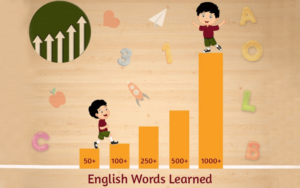
30 Nov Importance of the English Language in Early Years
Meera had always dreamt of making her way into a big IT firm in her city and she excitedly applied to companies and IT firms for obtaining a good job opportunity. But there was just one problem, which was making her nervous about stepping into the environment.
Meera was smart and she was good at her work too, but she was getting nowhere with her job interviews. Her poor English vocabulary often came in the way of conversations and sometimes also made her the target of jokes among her friends.
She was trying to improve herself gradually by watching shows and reading books in English, but it was taking her more time than it did to solve a math equation.
Every moment that passed by, Meera kept dreading the fact that her family never put more emphasis on her learning the language during her early years and she made a promise to herself that she would not let her children face the same problems as her.
The Benefits of Learning English at an Early Age

Meera’s situation is a sad truth among the youth today in developing and underdeveloped countries around the world. Today, we live in a fast-moving world, where English is a common medium of communication among people everywhere. Hence, it is highly impertinent for parents in the present age to understand the importance of teaching preschoolers to be comfortable with the English language. The importance of building a child’s foundation for the English language at a young age can be seen in the fact that not doing so can lead to lacking the ability to communicate effectively, which usually occurs later in life, like Meera.
If you did not know, the minds of young children are natural acquirers of language. This means that their minds are self-directed towards picking any language without making any efforts as in the case of grown-ups. Furthermore, at an early age, children also have the gift to imitate pronunciation making learning to talk in English an easy job for them. It could come as a surprise, but children learn language skills right from infancy during a stage called the “silent period”, before they learn to speak. During this period children only look, listen and communicate through facial expressions or gestures.
Some of the benefits that children can gain by learning the English language at an early age are as follows-
- Innate Learning Abilities: At an early age, young children possess innate language-learning strategies, which help them acquire their mother tongue first and later to pick up English speaking skills. Also, Teaching English as a second language to children while they are still young can help them learn more languages by using the same innate language-learning strategies throughout life.
- More Time to Learn: Children have the time to play and learn the English language via activities with an adult. The activity first helps them to make sense of the exercise and then to get meaning from the adult’s shared language.
- Less Stressful Stage: Unlike grown-ups, children, at an early age have more time to fit the English language into their daily activities, hence giving them more space and less stress to learn.
- Better Pronunciation Skills: Children who acquire the English language on their own, rather than consciously learn it, are more likely to have better pronunciation skills.
Additional benefits that your child could reap from learning this global language, as they grow are great options for higher studies in foreign countries as well as rewarding job opportunities in big corporates and companies.
Where does the problem exist?

There is more than one reason behind this dilemma. However, some of the most impactful causes are –
- Parents in most countries are scared that if their children learned the English language first, they would forget their mother tongue or not learn it all.
- Learning of the English language is only restricted to schools. Back home, most families communicate in their mother tongue or watch regional channels for entertainment. Hence, there is very little scope for growth.
- In some schools, students end up conversing with each other in their mother tongue during breaks. Sometimes teachers too are seen doing the same. Hence, whatever that is learnt in the classroom is not put into practice and this results in poor vocabulary skills.
If parents want their children’s future to take a turn in the best direction, their mindsets have to change so that kids can become more confident, smarter, and open-minded as they grow. With this, we can conclude that English is truly an important language that parents must introduce to children as soon as possible in their lives. If you as a parent are wondering about where you can find fun activities to teach English to your little one then look no further. The OckyPocky app is packed with tools and fun activities to help you and your child bond and learn together in enjoyable ways you never would have thought of.

Sridevi Rao
Posted at 04:56h, 19 JanuaryIts true that spoken English is an important issue. But being a teacher with many years of experience, I find that a lot of stress us put on writing skills in the early years. It starts from there. Schools should come up with more activities that will encourage the children to speak.
Teachers must concentrate on enhancing the speaking skills of children at all levels.
Its also important that teachers are patient enough to hear the children out!